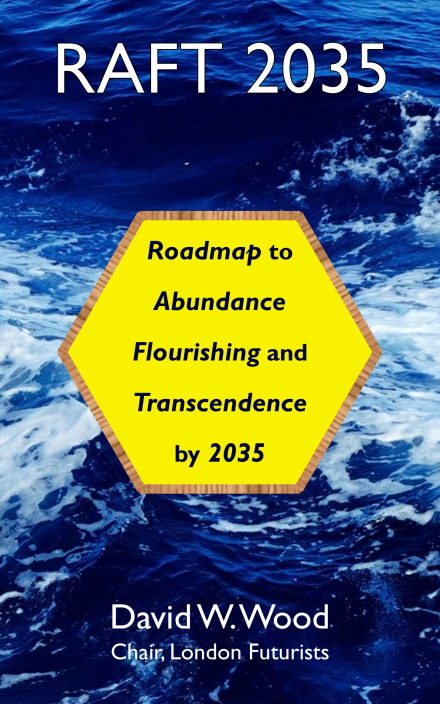Available for purchase and download (from 20th March 2015)
Quotations from the book
- “This book takes as its starting point the observation that technology has the potential to radically transform politics. The observation is simultaneously inspiring and frightening.”
- “Anyone who cares about the future of technology needs to care about the future of politics”
- “The goal of Transpolitica is to catalyse a transformation of the global political dialogue”
- “Accelerating technological progress has the potential to transform lives in the next ten years more profoundly than in any preceding ten year period in history”
Table of contents
- An introduction to tomorrow’s politics, by David Wood
- Democratic Intelligence, by Stephen Oberauer
- The Case For Universal Prosperity, by Michael Hrenka
- Catalysing the Development of Artificial Intelligence Tools, by Roland Schiefer
- Anarchy beyond socialism and capitalism, by Waldemar Ingdahl
- Political Transhumanism and the Transhumanist Party, by M. Amon Twyman
- The Vision Thing, by René Milan
- The Zeitgeist of Change, by Stuart Mason Dambrot
- Mediated Patent Equities For Accelerated Biomedical Research, by Maximo Ramallo
- Accelerating Politics, by Sally Morem
About this book
This book takes as its starting point the observation that technology has the potential to radically transform politics. The observation is simultaneously inspiring and frightening.
Accelerating technology is already in the process of radically transforming many other areas of life – including education, entertainment, health, transport, the environment, and warfare. Some of these changes are highly beneficial; others are deeply troubling. In yet other cases, the implications remain unclear. So it is with the changes that technology can bring to politics. Technology can change politics in ways that are variously beneficial, troubling, and hard to fathom.
The relationship runs both ways. Just as technology can alter politics, so also can politics alter technology. The speed and direction of technological adoption is strongly influenced by social and psychological factors, by legislation, by subsidies, by incentives, and by the provision or restriction of public funding. Political action can impact all these factors, either for better or for worse. Anyone who cares about the future of technology needs, therefore, to care about the future of politics.
These bidirectional overlapping sets of influences – politics impacting the development and deployment of technology, and technology impacting the evolution and effectiveness of politics – deserve a greater share of our collective attention. They merit a higher priority in the overall global conversation about the future of society. That’s for two reasons.
First, accelerating technological progress has the potential to transform lives in the next ten years more profoundly than in any preceding ten year period in history. Radical technological changes are coming sooner than most politicians appreciate. Technology fields such as nanotechnology, synthetic biology, renewable energy, regenerative medicine, brain sciences, big data analytics, robotics, and artificial intelligence, are all undergoing rapid evolution. Improvements are feeding further improvements, in compound positive feedback cycles. Together, these technologies will change society in unexpected ways, disrupting familiar patterns of industry, lifestyle, and thinking.
But second, alongside the potential for exceptional benefits from these changes for both the individual and society, there is the potential for tremendous risk. The potential risks – like the potential benefits – are hard to anticipate with any confidence. Collectively, we need to improve our powers of anticipation, and to deepen our resilience in readiness for surprise developments. We need to learn to look with greater perception into the set of possible future scenarios. Improved foresight will increase our ability to spot potential oncoming threats (before they become too damaging) and potential major opportunities (before they slip outside of our collective grasp due to inaction on our part). And once we notice these major change factors ahead, we need to become better at making these future scenarios vivid, so that society as a whole includes these factors in the global dialogue. This book is dedicated to these tasks.
The goal of Transpolitica – founded in January 2015 – is to catalyse a transformation of the global political dialogue. We wish to encourage politicians and political observers from all parties (and those with no existing alignments) to urgently:
- Think through, in advance, the potential consequences of rapid technological change
- Take part in a wide public discussion and exploration of these forthcoming changes
- Adjust public policy in order to favour positive outcomes
- Support bold regenerative projects to take full advantage of accelerating technology – projects with the uplifting vision and scale of the 1960s Apollo moonshot program.
The essays in this book present views from futurists, technoprogressives, and transhumanists from around the globe. Welcome to the conversation about the future of politics!
Cover credits
The cover of Anticipating tomorrow’s politics was designed by Alberto Rizzoli, and was the winning entry from a number of candidates entered into a public vote.
The photo in the middle of the above book cover is re-used by permission from the excellent site Unsplash, https://unsplash.com/mujiebok, and is by Unsplash contributor Sudiono Muji. The terms stated on the site are ” Free (do whatever you want) high-resolution photos from Sudiono”:
UNSPLASH LICENSE
All photos published on Unsplash are licensed underCreative Commons Zero which means you can copy, modify, distribute and use the photos for free, including commercial purposes, without asking permission from or providing attribution to the photographer or Unsplash.


